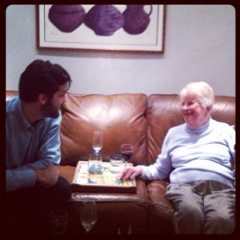Good News on Dementia?

Harriet speaks to the future.
My mother-in-law, Harriet, is a delightful nonagenarian who is still as sharp as a tack. What’s the secret to her mental acuity? I’m willing to bet that the fact that she’s an avid bridge player has something to do with it.
Indeed, Harriet may be a leading indicator of the changing shape of the dementia demographic. Conventional wisdom holds that our health care system is about to be overwhelmed as the baby boom ages and sinks into dementia.
The logic is straightforward. Major premise: Old age is the leading risk factor for dementia. Minor premise: People are living longer. Conclusion: Everybody will become demented sooner or later and our health care system will collapse.
In the current issue of New Scientist, however, Liam Drew reports on new research that suggests that Harriet may be an emblem of change, not an exception to it. As Drew points out, the conventional wisdom “… is based on the assumption that people will continue to develop dementia at the same rate as they always have.” Drew then reports on two studies that suggest this assumption is no longer true (if it ever was).
The first is a research report from the Lancet that compares two dementia censuses conducted 20 years apart in three regions the U.K. The first census, conducted in 1994, counted 650,000 people with dementia. In 2013, the researchers repeated the study and, assuming that the dementia rate held steady, projected that they would find 900,000 people with dementia. Instead, they found about 700,000. The report concludes that, “Later-born populations have a lower risk of prevalent dementia than those born earlier in the past century.”
The second study, conducted in Denmark, reached essentially the same conclusion. The research compared people born in 1905 with those born in 1915. Drew reports that, “While the two groups had similar physical health, those born in 1915 markedly outperformed the earlier-born in cognitive tests.”
So, what’s going on? Well, for one thing, we’re taking better care of our hearts. In general, healthier hearts provide better circulation. More oxygen-rich blood reaches our brains, which probably improves brain health. A heart healthy lifestyle may also be a brain healthy lifestyle.
Another theory is cognitive reserve, which suggests that we may be able to make our brains more resilient and resistant to damage. In other words, the brain is not just a “given”; it can be developed in much the same way that a muscle can. As Wikipedia puts it, “Exposure to an enriched environment, defined as a combination of more opportunities for physical activity, learning and social interaction, may produce structural and functional changes in the brain and influence the rate of neurogenesis … many of these changes can be affected merely by introducing a physical exercise regimen rather than requiring cognitive activity per se.”
What creates cognitive reserve? Educational attainment seems to play an important role. Physical and social activity also seem to contribute. I can’t help but wonder whether playing bridge – which combines social and cognitive elements – might not be the perfect way to build our cognitive reserves.
Over the years, we’ve all learned a lot from Harriet. She’s smart and she’s wise. And she may just have taught us how to live intellectually rich lives for many years to come. Thank you, Harriet.
Thanks, Travis, for describing Harriet so well.